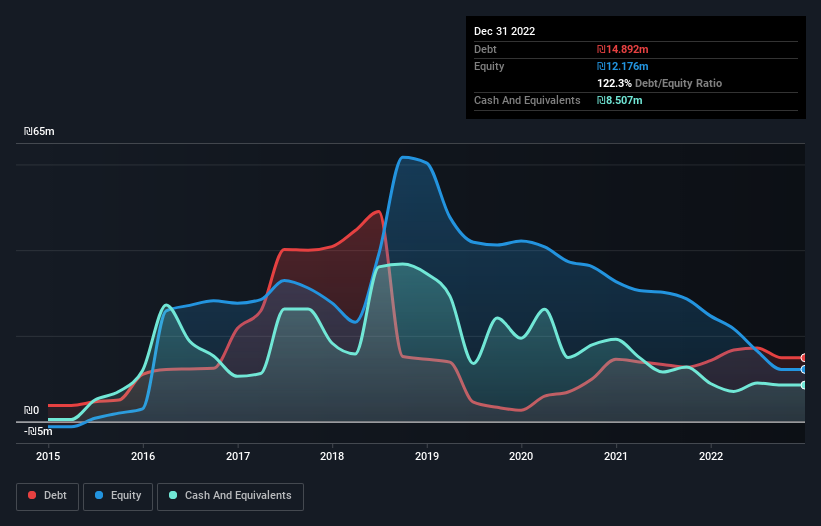
The external fund manager backed by Berkshire Hathaway's Charlie Munger, Li Lu, makes no bones about it when he says 'The biggest investment risk is not the volatility of prices, but whether you will suffer a permanent loss of capital.' When we think about how risky a company is, we always like to look at its use of debt, since debt overload can lead to ruin. We note that Cofix Group Ltd (TLV:CFX) does have debt on its balance sheet. But should shareholders be worried about its use of debt?
When Is Debt A Problem?
Debt and other liabilities become risky for a business when it cannot easily fulfill those obligations, either with free cash flow or by raising capital at an attractive price. In the worst case scenario, a company can go bankrupt if it cannot pay its creditors. However, a more usual (but still expensive) situation is where a company must dilute shareholders at a cheap share price simply to get debt under control. By replacing dilution, though, debt can be an extremely good tool for businesses that need capital to invest in growth at high rates of return. When we think about a company's use of debt, we first look at cash and debt together.
Check out our latest analysis for Cofix Group
How Much Debt Does Cofix Group Carry?
You can click the graphic below for the historical numbers, but it shows that as of December 2022 Cofix Group had ₪14.9m of debt, an increase on ₪14.2m, over one year. However, it does have ₪8.51m in cash offsetting this, leading to net debt of about ₪6.39m.

How Strong Is Cofix Group's Balance Sheet?
We can see from the most recent balance sheet that Cofix Group had liabilities of ₪115.5m falling due within a year, and liabilities of ₪106.5m due beyond that. Offsetting these obligations, it had cash of ₪8.51m as well as receivables valued at ₪14.2m due within 12 months. So its liabilities outweigh the sum of its cash and (near-term) receivables by ₪199.4m.
This deficit casts a shadow over the ₪104.9m company, like a colossus towering over mere mortals. So we'd watch its balance sheet closely, without a doubt. After all, Cofix Group would likely require a major re-capitalisation if it had to pay its creditors today. When analysing debt levels, the balance sheet is the obvious place to start. But it is Cofix Group's earnings that will influence how the balance sheet holds up in the future. So when considering debt, it's definitely worth looking at the earnings trend. Click here for an interactive snapshot.
In the last year Cofix Group's revenue was pretty flat, and it made a negative EBIT. While that's not too bad, we'd prefer see growth.
Caveat Emptor
Importantly, Cofix Group had an earnings before interest and tax (EBIT) loss over the last year. Indeed, it lost ₪3.3m at the EBIT level. Considering that alongside the liabilities mentioned above make us nervous about the company. We'd want to see some strong near-term improvements before getting too interested in the stock. It's fair to say the loss of ₪9.9m didn't encourage us either; we'd like to see a profit. And until that time we think this is a risky stock. When analysing debt levels, the balance sheet is the obvious place to start. However, not all investment risk resides within the balance sheet - far from it. For example, we've discovered 2 warning signs for Cofix Group (1 is concerning!) that you should be aware of before investing here.
At the end of the day, it's often better to focus on companies that are free from net debt. You can access our special list of such companies (all with a track record of profit growth). It's free.
New: AI Stock Screener & Alerts
Our new AI Stock Screener scans the market every day to uncover opportunities.
• Dividend Powerhouses (3%+ Yield)
• Undervalued Small Caps with Insider Buying
• High growth Tech and AI Companies
Or build your own from over 50 metrics.
Have feedback on this article? Concerned about the content? Get in touch with us directly. Alternatively, email editorial-team (at) simplywallst.com.
This article by Simply Wall St is general in nature. We provide commentary based on historical data and analyst forecasts only using an unbiased methodology and our articles are not intended to be financial advice. It does not constitute a recommendation to buy or sell any stock, and does not take account of your objectives, or your financial situation. We aim to bring you long-term focused analysis driven by fundamental data. Note that our analysis may not factor in the latest price-sensitive company announcements or qualitative material. Simply Wall St has no position in any stocks mentioned.
About TASE:CFX
Cofix Group
Operates and franchises coffee shops and supermarkets in Israel and internationally.
Good value with mediocre balance sheet.
Market Insights
Community Narratives



